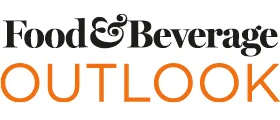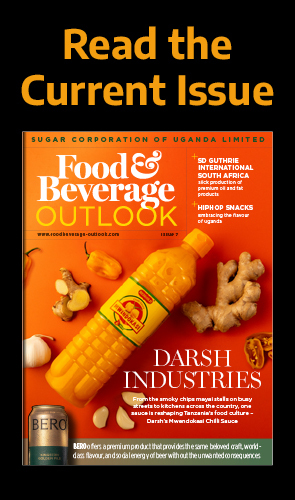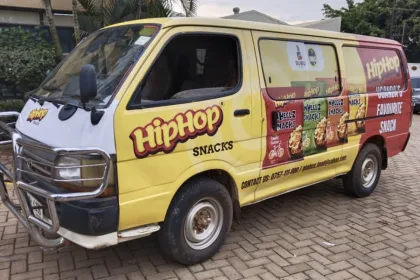BIGGBY® COFFEE has evolved from a beloved café in Michigan to a thriving business model with a notable presence. Mike McFall, co-Founder and co-CEO, discusses the importance of community among franchisees and a commitment to sustainable coffee sourcing.
FROM LOCAL FAVOURITE TO FRANCHISE PHENOMENON
Coffee was introduced to North America in the early 17th century, however it gained popularity during the Boston Tea Party in 1773.
This event marked a pivotal moment in the patriotic rebellion against British rule, leading to coffee overtaking tea as the most popular drink in the US.
Today, there are over 40,000 coffee stores across the country, many of which have a global presence or operate under national franchise models.
One notable example of the latter is BIGGBY® COFFEE, which is primarily located in the Midwestern region, with a heavy concentration in Michigan (MI).
Initially established in the vibrant city of East Lansing, MI, the franchise has since expanded further south into the warm and welcoming states of Florida and Tennessee, brewing success throughout much of the eastern US.
From a burgeoning local coffee store to operating in 13 states with 430 stores and 120 valid franchise agreements in place for future locations, the company is poised for strong growth, indicating a promising rate of expansion.
“There are development schedules in place where individuals have committed to opening a specific number of stores within a designated timeframe. Furthermore, legitimate franchise contracts have been signed, indicating that the franchisees have officially pledged to secure real estate and plan to open their locations within the next 12 to 24 months,” introduces Mike McFall, co-Founder and co-CEO.
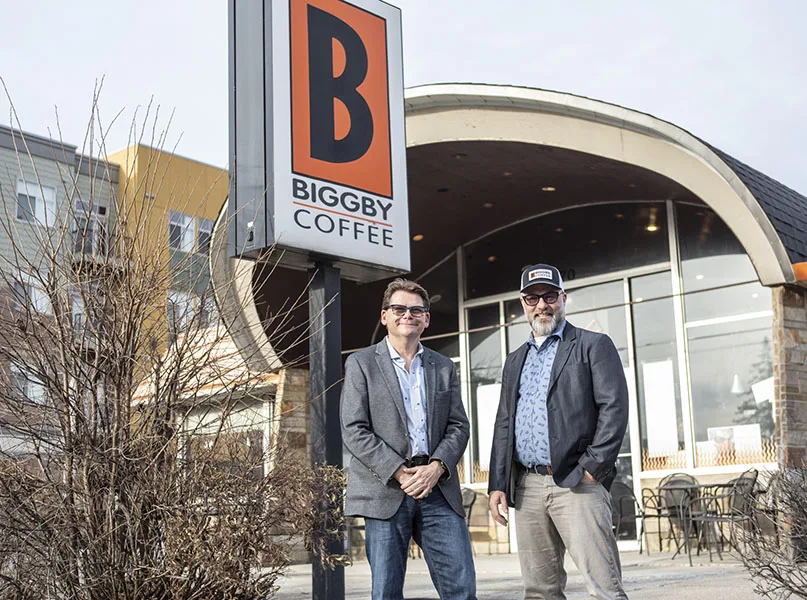
“Five years after our inception, we made a pivotal decision to embrace franchising. For some time, we operated a hybrid of company-owned stores and franchises; however, in 2006, we took a significant step by selling our company-operated locations and fully dedicating ourselves to this dynamic model, and we’ve been flourishing as a franchise organization for nearly 20 years now,” he follows up.
Individuals enter into contracts to establish a BIGGBY® COFFEE store in their chosen market, granting them rights to the menu, operating system, logo, intellectual property, and trademarks.
“Our drinks are trademarked, and we have a solid menu and operating system in place, but the key to our franchise model is the supportive community it creates. By joining us, you’ll associate with passionate and dedicated individuals, which is essential for thriving together. We’re excited about building a successful franchise where everyone’s accomplishments are connected.”
McFall recognizes that being a franchisee involves not only a relationship with the franchisor but also with other owners, as their experience can offer valuable insights and knowledge.
In BIGGBY® COFFEE’s straightforward business model, the franchise provider earns a percentage of each store’s revenue in exchange for services, systems, products, and intellectual property.
“By joining us, you’ll associate with passionate and dedicated individuals, which is essential for thriving together. We’re excited about building a successful franchise where everyone’s accomplishments are connected”
Mike McFall, co-Founder and co-CEO, BIGGBY® COFFEE

BEHIND THE BEANS
As McFall prepared to return to graduate school in East Lansing, he accepted a job as a barista at the original BIGGBY® COFFEE store.
This position unveiled his passion for hospitality, which had been evident in his varied work experiences, and ignited his motivation for creating the franchise brand.
“Every morning, I looked forward to crafting drinks and spreading joy to our customers. I felt a strong connection to the coffee industry and recognized its growth potential, particularly as Starbucks was expanding into new locations.
“Inspired by my employer and now business partner, Bob Fish, who was running successful restaurants specializing in espresso-based beverages, we began discussing a potential collaboration. He agreed that I would step into a management role, which ultimately led to the creation of BIGGBY® COFFEE. This venture has been a journey filled with passion and inspiration,” he expresses earnestly.
This enthusiasm spills over into procuring coffee beans, exemplifying BIGGBY® COFFEE’s farm-direct approach and fostering many valuable relationships.
“Bob and his wife, Michelle, have been developing a program for six years to source coffee beans more effectively. By building direct relationships with farmers, we help them create sustainable economic models, enabling long-term investments that benefit their communities. This is critical work supported by our comprehensive strategy,” explains McFall.
BIGGBY® COFFEE has established a list of criteria for selecting the farmers it works with. One of the most exciting aspects of the program is the development of the farm-direct model and its full-circle nature.
Every year, the company brings the farmers to Michigan for an annual meeting, where many of them meet for the first time, giving them the opportunity to see the coffee they grew, hand-picked, and processed being served in BIGGBY® COFFEE’s stores, which also showcases their photos.
“Serving a cup of coffee that the farmers grew and processed at one of our stores through the drive-thru window helps consumers to understand and develop relationships with the people cultivating their coffee in countries like Mexico, Honduras, or Mozambique. We believe fostering this connection is essential and dynamic for our brand and the community,” he declares.
When consumers begin to have expectations of retailers regarding how they treat growers or farmers, whatever the commodity, the economics of farming will change significantly, and for the better.
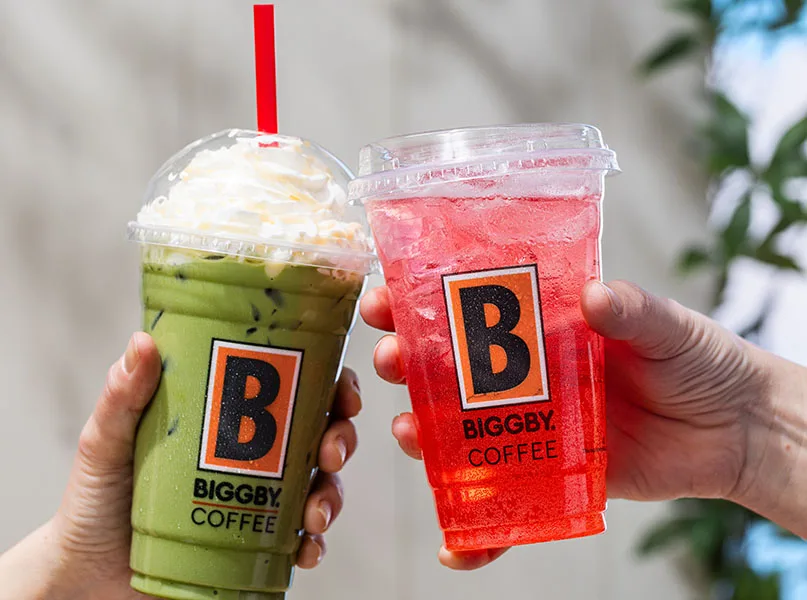
A COMMUNITY-CENTRIC COMMITMENT
The key factor that distinguishes BIGGBY® COFFEE stores is that they are locally owned, with owners deeply rooted in their neighborhoods, serving as true leaders in the areas where they operate.
“I am consistently amazed by the stories of support from our franchise owners for their local communities. For instance, I learned about a program called Big Brothers Big Sisters, a mentoring initiative that pairs younger children with older adolescents and college students.
“A woman recently reached out to me to share all the ways our franchise is contributing to this organization, and I was truly taken aback by the impact we are having,” McFall highlights emphatically.
The level of community involvement the company has is its most significant differentiator, as franchise owners genuinely care about and actively contribute to the well-being of their communities.
“When we compare ourselves to other brands, it’s clear the coffee store that has the strongest connections and community leaders will ultimately prevail, and I truly believe that’s why we succeed.”
BIGGBY® COFFEE sets itself apart in the marketplace largely due to its franchise owners, who shape the brand at retail level by developing an environment that caters to everyone.
“We want to position ourselves in a way that appeals to a broad audience, sitting comfortably among other coffee brands.
Our goal is for consumers who visit high-end specialty coffee shops such as Starbucks, Blue Bottle, or Intelligentsia to feel just as at home in our store as those who typically visit McDonald’s, Dunkin’, or a gas station convenience store.
“When you walk into a BIGGBY® COFFEE, you feel extremely comfortable, so I’d like to say we’re an exceptional coffee store that caters to the everyday American consumer,” opines McFall.

“By building direct relationships with farmers, we help them create sustainable economic models, enabling long-term investments that benefit their communities”
Mike McFall, co-Founder and co-CEO, BIGGBY® COFFEE
STRATEGIZING IN A COMPETITIVE COFFEE LANDSCAPE
BIGGBY® COFFEE is investing significantly in its technology stack, as this is the primary way customers interact with the company and make purchases.
The team previously engaged with customers in person, accepting cash and providing change directly. Now, they order through an app and pick up their purchases in-store, often resulting in minimal interaction.
This shift poses a significant challenge for BIGGBY® COFFEE as it seeks to differentiate itself in this evolving landscape.
“If you’re not investing in technology, you’re in trouble. We’re working hard to figure out how to stand out in a world where technology is driving the relationship between retailers and customers.
“The key question is, how do we offer a unique experience to consumers when many products have become commoditized? This is part of our focus on the tech stack – it’s not just about functional technology – it’s about defining our relationship with consumers,” observes McFall.
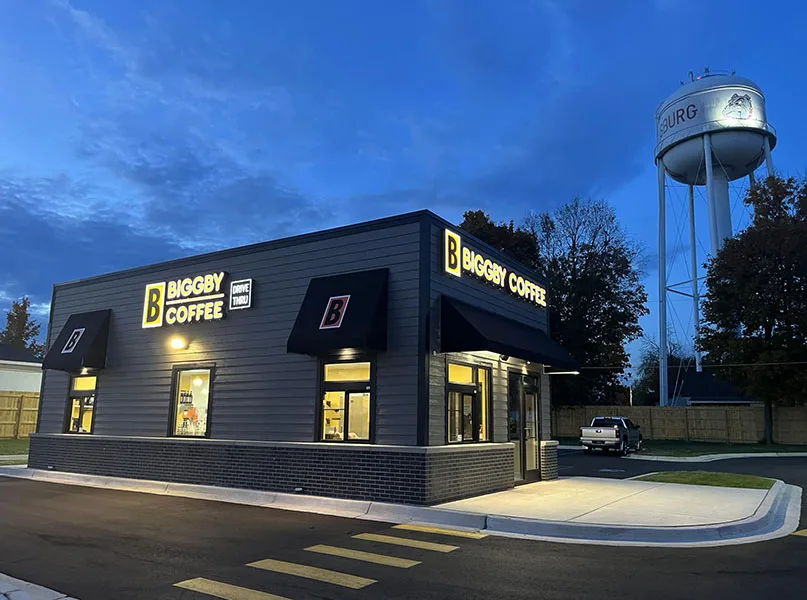
Additionally, BIGGBY® COFFEE is deeply engaged in building relationships, not only with farmers, which is crucial to the brand and its operations, but also between franchisees and their employees.
“We are currently developing a leadership retreat center that will be accessible to all our franchisees and their teams. Our goal is to offer programming that owners can use to help develop their staff. We began this investment last year and it is a significant initiative for us,” he informs.
Beyond these investments, the company is about to begin its annual planning process in a couple of weeks to prepare for 2026.
“We are focused on making strategic investments and ensuring we make the right decisions. We have 20 account representatives managing specific territories and have been transitioning to this model for five years; refining our approach will be our main priority this year.
“I usually think long-term with timelines of three to seven years in mind, so the upcoming year already feels like it’s behind me,” McFall concludes.
It’s clear that BIGGBY® COFFEE is about more than just coffee – it’s about creating a community of support, sustainability, and shared success, where every cup serves as a testament to its commitment to both quality and social responsibility, reflecting a thriving network of franchisees and a strong emphasis on ethical sourcing.
